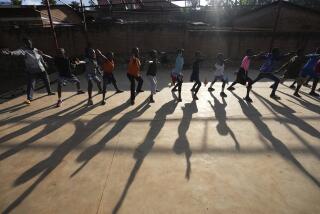Clinton Issues Appeal to Rwandan Factions : Africa: President calls for end to ethnic warfare and offers help in any negotiations. Rebels seal the border.
WASHINGTON — President Clinton appealed Saturday to leaders of Rwanda’s rival sides to halt their ethnic warfare, promising U.S. participation in any negotiations aimed at ending the continuing slaughter of civilians.
Also Saturday, Rwandan rebels sealed the border, stranding tens of thousands of people desperate to escape the violence.
“On behalf of all of the American people, I call on the Rwandan army and the Rwandan Patriotic Front to agree to an immediate cease-fire and return to negotiations aimed at a lasting peace in their country,” the President said in a special radio address.
He added: “I reaffirm the American commitment to participate in renewed negotiations.”
Clinton said the mass killing of Rwandans has “shocked and appalled” the world community and “touched the hearts” of all Americans.
More than 100,000 Rwandans are believed to have been slain over the last three weeks, with some estimates running as high as 200,000.
The President’s appeal came as warfare continued between Rwanda’s warring Hutu and Tutsi groups and a mass migration of refugees to neighboring Tanzania was reported.
Before the border was closed, about 250,000 men, women and children managed to cross into neighboring countries in a 24-hour period. They lugged sacks of food, mattresses and cooking utensils, the Associated Press reported. U.N. officials said it was the most rapid exodus they had ever witnessed.
U.N. officials said members of both groups were among the refugees. Most are believed to be Tutsi, who are afraid of being massacred by militias or Hutu-run government forces.
Relief workers at a makeshift refugee camp in Tanzania said they were already in desperate need of water. They said food supplies would last only four or five days.
The camp is a simple open space 10 miles from the Rwandan border, and the tens of thousands who had already arrived lacked any shelter.
There were about 30 to 40 U.N. workers and staff members from the Tanzanian Red Cross, the International Committee of the Red Cross and the humanitarian group Doctors Without Borders on hand to care for the throng.
“Some are sick, some are wounded, some are near starvation,” a senior aid official told the Reuters news agency. “They are still arriving. They will require massive international aid in the next few weeks to keep them alive.”
U.N. officials reported sporadic mortar exchanges between mostly Tutsi rebels of the Rwandan Patriotic Front and forces of the Hutu-dominated government in Kigali.
The Office of the U.N. High Commissioner for Refugees said police and militia gunned down 300 mainly Tutsi civilians from a crowd of 5,000 trying to escape from a sports stadium in the southwest town of Cyangugu on Friday.
It said it had reports that 40 to 50 people were butchered there each night.
Fighting in Rwanda erupted after President Juvenal Habyarimana and the leader of neighboring Burundi--both Hutus--were killed in a plane crash in Kigali on April 6.
Habyarimana’s presidential guard, some regular army troops and youth militias formed by Hutu-dominated political parties began killing government ministers and Tutsi and Hutu supporters of a plan to share power with the Tutsi in a proposed government.
With the bloodletting showing few signs of abating, U.N. Secretary General Boutros Boutros-Ghali asked the Security Council on Friday to reconsider its decision to withdraw all but a token contingent of U.N. forces from the country.
On Saturday, Salim Ahmed Salim, the secretary general of the Organization of African Unity, condemned the Security Council’s inaction.
“The Security Council must recognize it is the responsibility of the international community to end the large-scale killings and genocide being perpetrated in Rwanda,” Salim said.
In his radio address, Clinton applauded “the efforts of regional leaders actively engaged in the quest for peace.”
He called on the leaders of Rwanda “to recognize their common bond of humanity and to reject the senseless and criminal violence that continues to plague their country.”
A senior Administration official, speaking on condition of anonymity, said the White House hoped the taped message would be “pumped into Rwanda” to send a strong signal to those responsible for the bloodshed.
More to Read
Sign up for Essential California
The most important California stories and recommendations in your inbox every morning.
You may occasionally receive promotional content from the Los Angeles Times.










